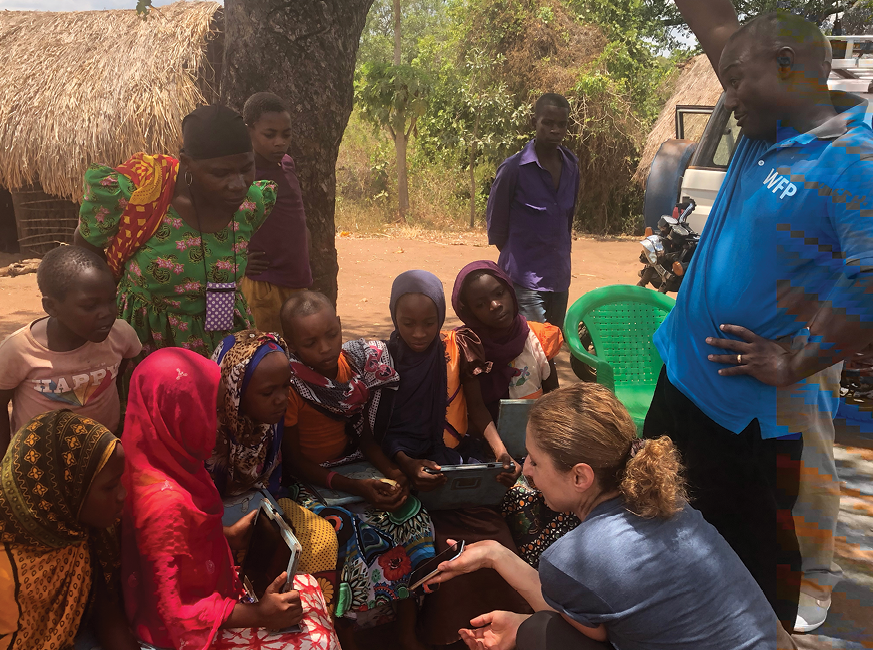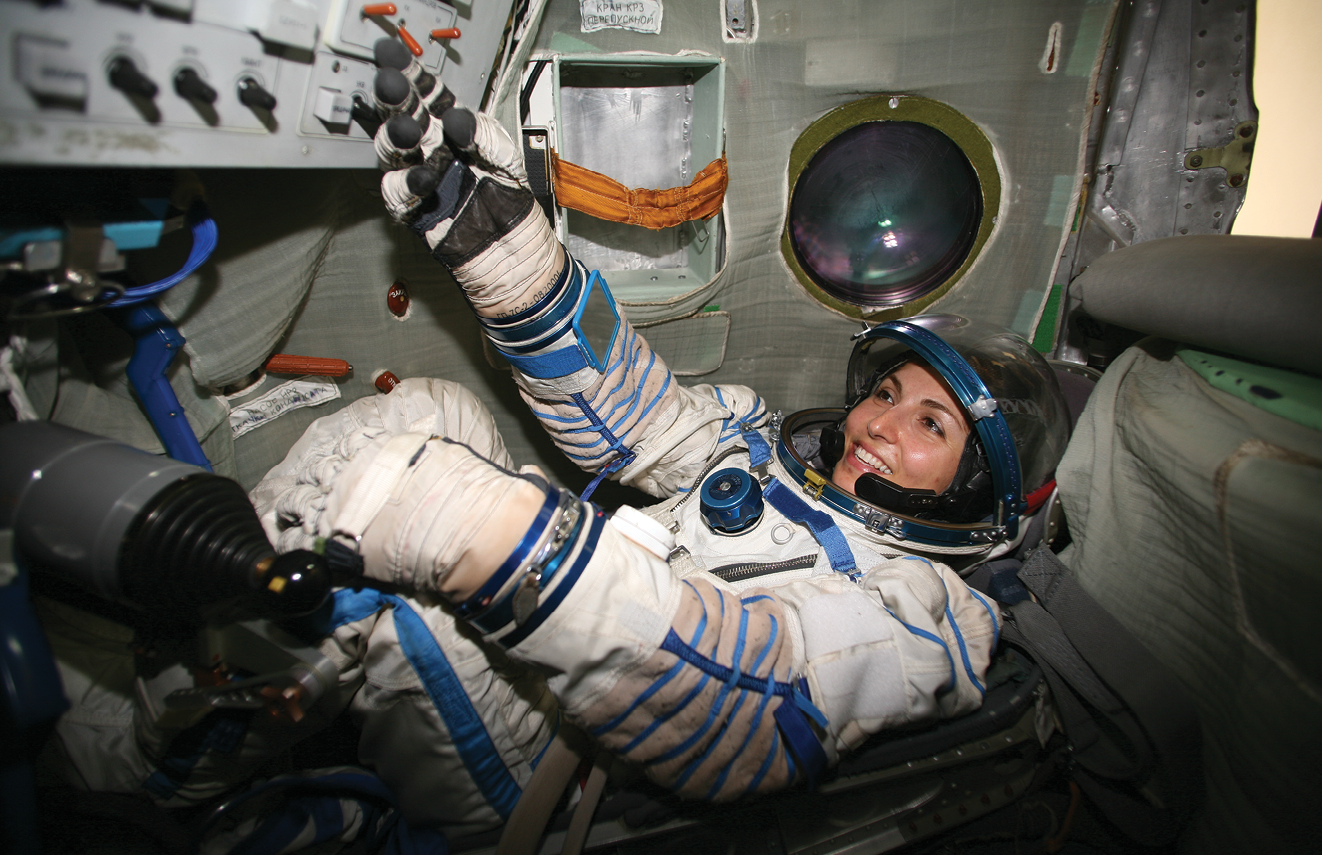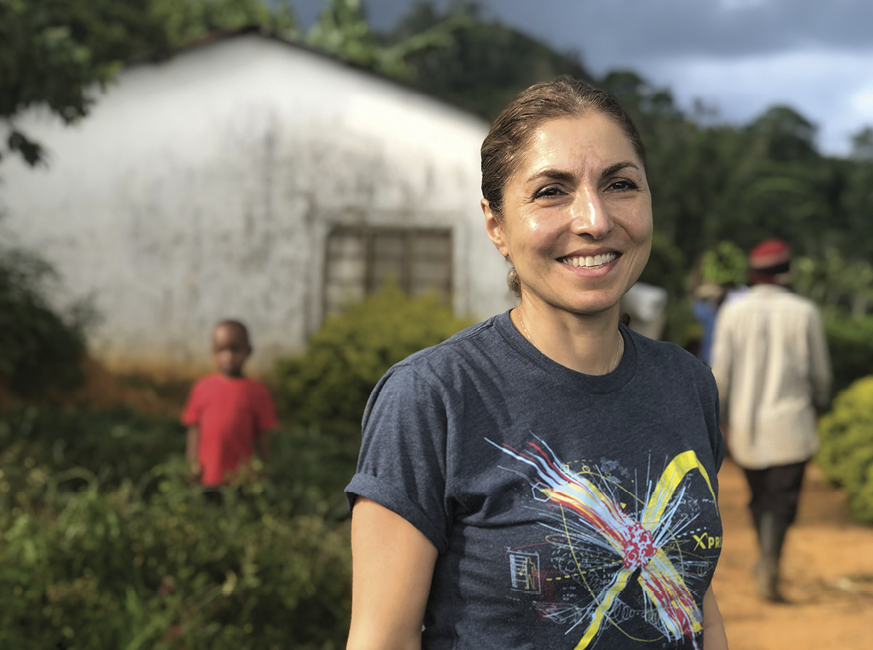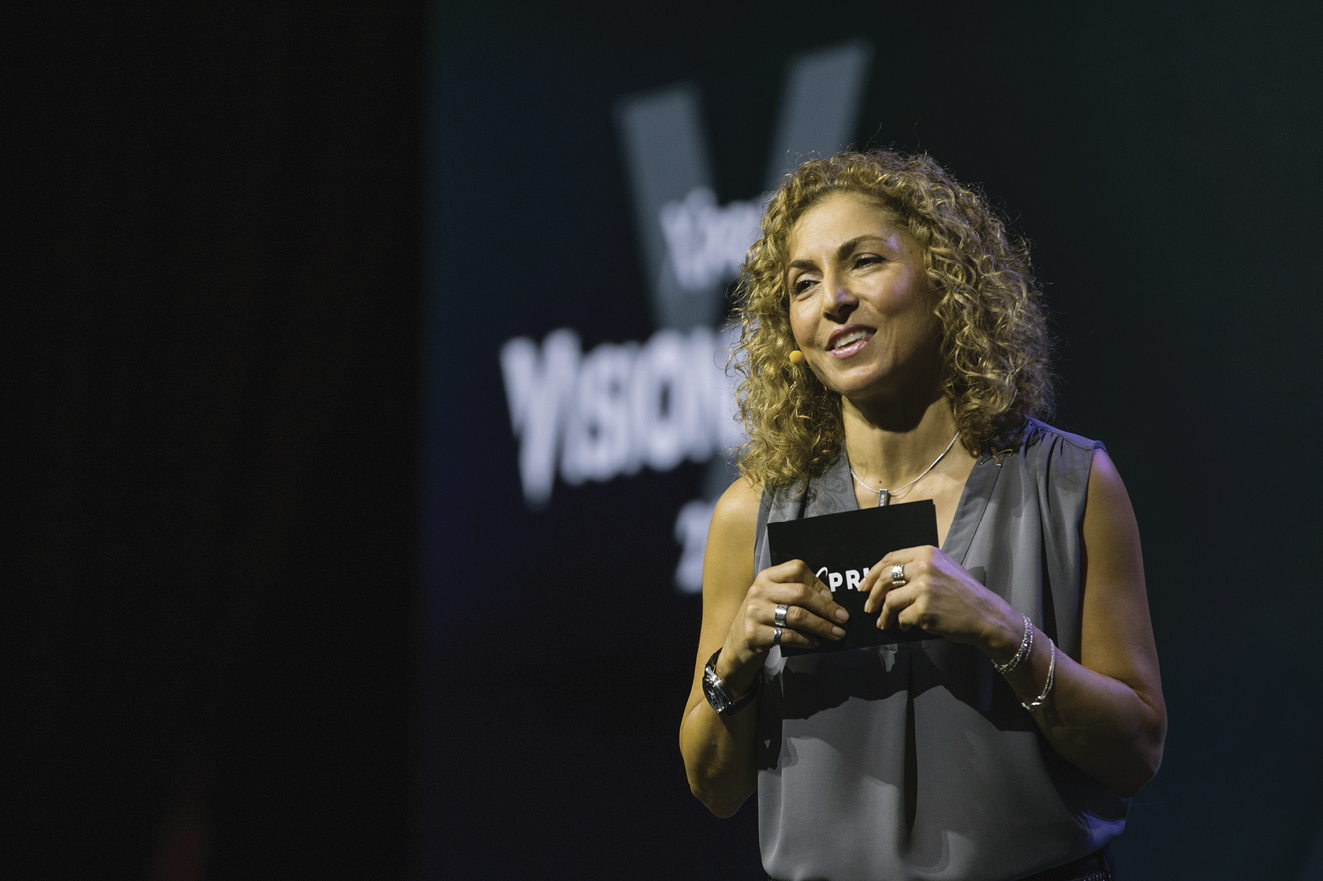- Home
- Media Kit
- MediaJet
- Current Issue
- Past Issues
- Ad Specs-Submission
- Ad Print Settings
- Reprints (PDF)
- Photo Specifications (PDF)
- Contact Us
![]()
ONLINE
![]()
ONLINE

Inspiring Innovation for Humanity’s Pressing Challenges
Editors’ Note
Anousheh Ansari is CEO of the XPRIZE Foundation, the world’s leader in designing and operating incentive competitions to solve humanity’s grand challenges. Ansari, along with her family, sponsored the organization’s first competition, the Ansari XPRIZE, a $10 million competition that ignited a new era for commercial spaceflight. Since then, she has served on XPRIZE’s Board of Directors. Prior to being named CEO of XPRIZE, Ansari served as the CEO of Prodea Systems, a leading Internet of Things (IoT) technology firm she co-founded in 2006, and continues to serve as the Executive Chairwoman. She captured headlines around the world when she embarked upon an 11-day space expedition, accomplishing her childhood dream of becoming the first female private space explorer, first astronaut of Iranian descent, first Muslim woman in space, and fourth private explorer to visit space. Ansari serves on the World Economic Forum’s (WEF) Global Future Council and has received numerous honors, including the WEF Young Global Leader, Ellis Island Medal of Honor, and STEM Leadership Hall of Fame, among others. She is a UNESCO Goodwill Ambassador and serves on the board of Jabil and Peace First, as well as several other not-for-profit organizations focused on STEM education and youth empowerment. Ansari also co-founded The Billion Dollar Fund for Women™, announced in October 2018 at the Tri Hita Karana (THK) Forum on Sustainable Development in Bali, with a goal of investing $1 billion in women-founded companies by 2020. She published her memoir, My Dream of Stars, to share her life story as inspiration for young women around the world. Ansari holds a bachelor’s degree in electronics and computer engineering from George Mason University, a master’s degree in electrical engineering from George Washington University; and honorary doctorates from George Mason University, Utah Valley University, and International Space University.

In Tanzania, Anousheh Ansari works with local children
as part of the Global Learning XPRIZE
How do you define XPRIZE’s mission and purpose?
At XPRIZE, our vision is to co-architect an abundant, hopeful, and equitable future for humanity. We do this by identifying barriers and grand challenges that humanity faces that are stopping us from achieving this desired future and then incentivizing radical breakthroughs for the benefit of humanity. Our audacious missions are started by identifying clear targets and inspiring the global community of problem solvers to build the solutions. By identifying the outcomes without specifying the approach, we maximize innovative approaches to find the best, most efficient solutions. Our competitions are long-term and large-scale, such as the $100 million XPRIZE Carbon Removal funded by the Musk Foundation. The competitions not only accelerate innovation, but create paradigm shifts, policy change and enable new markets.
You and your family sponsored the first XPrize competition, which offered a $10 million reward to the first non-governmental organization to launch a reusable crewed spacecraft into space twice in two weeks. What interested your family in becoming involved with XPRIZE?
It was my personal passion and dream of wanting to fly to space that persuaded the family to support it. I was on a search to find a way to fulfill my childhood dream of flying to space and I was disappointed and frustrated by the lack of advancement through the governmental space programs in including civilians in their mission to explore space. I was also disappointed by the lack of innovation which was due to a lack of competition and incentives. Serendipity brought Peter Diamandis, the founder of XPRIZE, and me together and I learned about the idea of a competition modeled after the Orteig Prize and how Charles Lindberg’s flight opened up the aviation industry. As an entrepreneur, the incentive prize model was a no-brainer for me. Competition inspires crowdsourced solutions without a payout until the solution is actually built and tested, which minimizes risk. The competition took a long time before it was finally won by SpaceShip One from Mojave Aerospace Ventures, led by Burt Rutan, on October 4, 2004. Now, in 2022, the private space industry is a $2 billion dollar sector and growing rapidly and the cost of access to space has been reduced by a factor x100 due to competition and better policies.
How has XPRIZE’s focus evolved since its founding and what are the key areas that the Foundation focuses on today?
Since the first XPRIZE proved successful, we’ve used this model to inspire innovation for humanity’s pressing challenges across other sectors and have seen similar and better results. We focus our work on climate and energy, biodiversity and conservation, health, circular economies, deep tech, and space and exploration. While our mission is the same, we have expanded the domains we operate in beyond space.

On September 18, 2006, Anousheh Ansari embarked
upon an 11-day space expedition on the ISS
How did XPRIZE Foundation adapt its work to address the global pandemic?
As we saw how the pandemic halted the normal course of life and presented us with unprecedented challenges, we explored new models to engage our vast community that we had built the past 25 years to see how we can help accelerate solutions to help society through the pandemic. Our first step was to convene the best minds, innovators, policy-makers, researchers, and scientists to identify all the different ways our society is suffering. We created a series of meetings with over 150 participants on a weekly basis to organize ideas, incentivize short-term competitions and create partnerships to accelerate global solutions. This work gave birth to the XPRIZE Pandemic Alliance, which is a collaborative effort between all stakeholders. It’s been incredibly encouraging to see how many are participating, helping push solutions and breakthroughs forward. But for the most part, it has been about sharing and working towards a common goal of solving COVID.
In total, we launched four competitions: the XPRIZE Rapid COVID Testing Competition, the Pandemic Response Challenge, XPRIZE Rapid Reskilling, and the XPRIZE NextGen Mask Challenge. In our fight to find COVID-19 solutions, we engaged 437 alliance thought leaders, generated 289 COVID-19 solutions ideas, and 18 projects were initiated.
“Since the first XPRIZE proved successful, we’ve used this model to inspire innovation for humanity’s pressing challenges across other sectors and have seen similar and better results. We focus our work on climate and energy, biodiversity and conservation, health, circular economies, deep tech, and space and exploration.”
When you are focusing on large, complex issues which require a long-term focus and commitment, how do you define success for the XPRIZE with its work?
Our main priority is impact. Beginning with the first principle of thinking to break down the challenges to find wherein our prize designs, we can incentivize the most important things to maximize impact. Once a prize ends, how competitor’s technologies scale from competition to real world applications and impact manifests differently. As an example, the Ansari XPRIZE’s impact is just being felt now, nearly 20 years later, with its impact in lowering the cost of access to space and opening the space frontiers to more people.
Our NRG COSIA Carbon XPRIZE, which ended in 2021 and challenged teams to turn waste CO2 into valuable products, is already seeing many of its finalists change the world by helping the climate change fight with their innovations. Our XPRIZE Rapid COVID Testing asked innovators to develop testing solutions that could help testing shortages for this current pandemic, but many of these tests could be used for future pandemics which will help alleviate supply chain problems. Impact isn’t always easy to measure or achieve, and we’re constantly trying to improve, but it is our north star.

In Tanzania, Anousheh Ansari works with the finalists of t
he Global Learning XPRIZE,
where teams field tested
their education technology solution in Swahili
How do you define the importance of space exploration to the future of humanity?
Space research and technologies have had a dramatic impact on our lives, from communications, entertainment, banking, GPS, to very sophisticated Earth observation and meteorology. In addition, development of material and technologies in space has brought us light and durable materials we use in our clothing, aviation and other industries, and research on the International Space station has advanced our health, medicine, and material science significantly. Thanks to the new space economy enabled by the Ansari XPRIZE, we are now looking at more innovation and commercial businesses looking at Low Earth Orbit manufacturing, energy production, and other business opportunities.
In addition, space research and astronomy helps us better understand the origin of our universe and what surrounds us which is a way to find answers to our oldest question: why are we here and where are we going?
“The Billion Dollar Fund for Women was founded by four women who in one way or another had experienced how women with great ideas have a hard time bringing their ideas to bear due to lack of funding and support. Despite multiple reports from many different sources looking at historical data, proving that women founders do better on the average and have higher success rates, women have always suffered from lack of interest in investment, especially in fields like technology.”
You co-founded Prodea Systems, a leading Internet of Things (IoT) technology firm in 2006. Did you always know that you had the entrepreneurial spirit and desire to build your own business?
I never thought of myself as an entrepreneur and never had the desire to build a business, however I was always a problem-solver and had an active imagination and curious mind. I believe these are all great ingredients for entrepreneurs. At the core, entrepreneurs get curious and interested in a problem and they don’t rest until they solve it. Usually, problems can represent great opportunities as well. That’s why I went to engineering school and became an engineer instead of business school.
You also co-founded The Billion Dollar Fund for Women which had a goal of investing $1 billion in women-founded companies by 2020. Will you discuss this effort and the impact that The Billion Dollar Fund for Women has made?
The Billion Dollar Fund for Women was founded by four women who in one way or another had experienced how women with great ideas have a hard time bringing their ideas to bear due to lack of funding and support. Despite multiple reports from many different sources looking at historical data, proving that women founders do better on the average and have higher success rates, women have always suffered from lack of interest in investment, especially in fields like technology. We started The Billion Dollar Fund for Women to bring awareness and attention to this issue, not just through words, but through action, and we were able to get investment globally to pledge over a billion dollars to invest in woman-founded or led companies. We hope that their experience will inspire them to grow and invest more in women-led companies and use this network to find female entrepreneurs who have great ideas and great companies and want to start or scale them.

Anousheh Ansari speaking at Visioneering, XPRIZE’s
annual gathering
to design and evaluate future competitions
with global philanthropists,
entrepreneurs and thought leaders
Your memoir, My Dream of Stars, shares your life story. What interested you in writing the book and what are the key messages you wanted to convey in the book?
I am not a writer and didn’t intend to write a book, however after my journey to space, I found that my story was inspiring women and young girls all over the globe to pursue their passion. I didn’t have a lot of role models growing up and learned many things through trial and error. Even though I was and continue to do talks all over the world, especially addressing young women, through my memoir I wanted to reach more people and be able to tell them my entire story, not just the glory of space but all the challenges and the ups and downs that life brings. I hope people find inspiration, strength, and hope reading my memoir. We all have dreams and it is easy to give up on them. My Dream of Stars is about helping people find the courage to go after their seemingly impossible dreams.
You commit your time and energy to supporting several nonprofits. How do you decide where to focus your efforts?
It is simple, I have two focuses in life, XPRIZE and youth empowerment. Anything other than these two, I don’t spend any resources on.
What advice do you give young women interested in STEM and what can be done to build more interest and awareness around STEM?
I am a big proponent of women in STEM. Our lives are already driven by technology and in the future everything we do and how we live will depend on technology. Today, most of these products, services and solutions are designed by men, and therefore it does not serve half of our society well. By having more female voices at the table and being involved in the design of these new technologies, we can ensure we have solutions that serve women as well as men and provide a more equitable society.
You were the first female private space explorer, the first astronaut of Iranian descent, the first Muslim woman in space, and the fourth private explorer to visit space. Do you reflect on this accomplishment and take moments to appreciate what you have achieved or are you always looking to the future?
Titles have never been meaningful to me. It does, however, provide a platform where my voice and ideas can be heard more widely and I appreciate this. My nature is to look forward, while I keep the lessons of the past close to heart. I believe staying in place causes stagnation and as the world changes around us and new knowledge is gained, we too need to change and be lifelong learners. My curious mind always keeps me questioning, wanting to learn more, and looking for what’s beyond the horizon.![]()